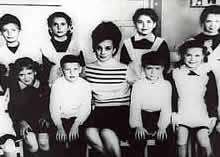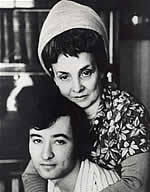Inverted Perspective - Obratnaya Perspectiva
A 35 mm documentary by Lily van den Bergh
When Olga Sergevna came to Amsterdam for the first time in 1991, with her son Oleg and his army friend Sergey, they stayed several summer months in the home of film maker Lily van den Bergh. Presented with the unique opportunity to observe their day-to-day encounters with Western society, she decided to record their experiences and reactions on film.
No one could have suspected that Olga would take her own life in that same city a year later. On the 26th July 1992, the very day on which her husband had died three years earlier, her body was dragged out of an Amsterdam canal. Her sudden death placed the documentary as planned in an entirely different perspective.
Olga Sergevna Skvortsova, an attractive woman of 67, twice married, first divorced then widowed, mother of two children, was formerly an English teacher and director of a secondary school. In her home town Leningrad she reveals her life story that reflects the history of her country.
The extraordinary events in her life are representative of the lives of many other Russians of her generation. History made their lives as their lives made history.
This insight gave an opportunity to shed light on Olga's life and death from a variety of different angles, and resulted in a multi-layered film.
Olga's life history is reflected on by the various protagonists. We hear her two sons comment on her life, as a Greek chorus. Without her, they return to the places where she was born and where she lived: Odessa, Stalingrad (now Volgograd) and Leningrad (now St. Petersburg), accidentally the three heroic cities of the Second World War.
Olga's death changes the lives of the protagonist. The film follows the search to understand Olga's death, which changes in the process, the lives of the others. One son realises that his life before Perestroika was rich and complete, that times have changed, but he sees no place for himself in the new era. The other son has always been under the influence of his parents, and could only start to live a life of his own after his mothers death. For him the new order represents the possibility to realise something for himself. Originally begun as an ironic tale of the adventures of three Russians in the West, the genre changes and the film begins to depict the tragedy of a human life. The film is growing with the filmmakers: they are the makers as well as the protagonists.
The inverted perspective results from a constant shift between the layers throughout the entire film. A game with time, past and present, and with space.
The inverted perspective is a mathematical term used in the art of painting (for example the Russian icons) opposite to the linear perspective used by Renaissance painters:‚Icon painting deliberately disregards the principle of natural perspective in order to avoid at any cost the illusion of three-dimensionality. Instead, it gives the impression of complete flatness and the lack of perspective. However, icon painting does use a perspective, called by scholars either reversed or inverted, just to indicate that this perspective is different than the illusionist perspective of the Italian masters. Inverted perspective depends on multiple points of view. But these multiple points of view are placed in front of the painting, not behind it, which results in background objects often being larger than the foreground ones and in distortions in shapes of some of the objects.‘
Alexander Boguslawski (1998-2005)

Production: |
© Open Studio Producties |
Director: |
Lily van den Bergh. |
Mucik: |
Andrei Frolov |
Script: |
Rachel Fabien |
Directors of Photography: |
|
| Russia: |
Naum Avrunin |
| Holland: | Adri Schrover |
| Sound Recordists: | |
| Russia: | Micha Belinsky |
| Holland: |
Cees van der Knaap |
Editors: |
Tamara Lipartia |
Cast: |
Olga Skvortsova |
Co-production: |
IKON Television, The Netherlands |
Subtitels: |
English, Dutch, Russian |
Length: |
110 min |
Format: |
35 mm / DIGI BETA |
Year: |
1996 / 1997 |
| Short version | 78 min |
Poster: |
Michal Shabtay |
With financial support of Dutch Film Fund and COBO Fund.
